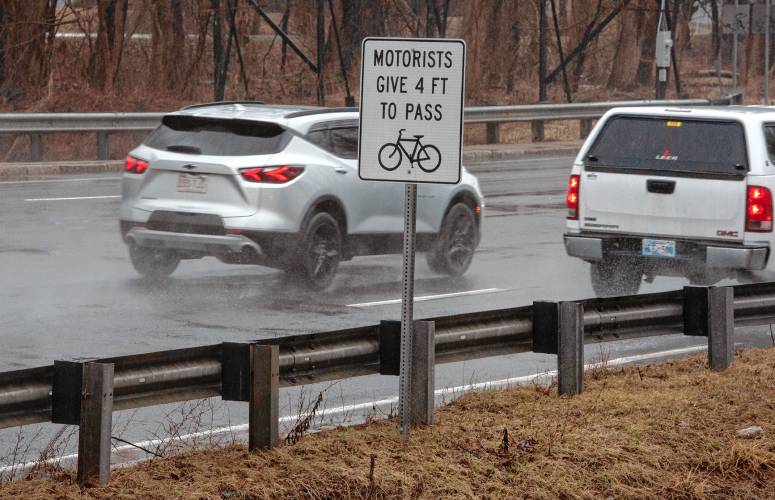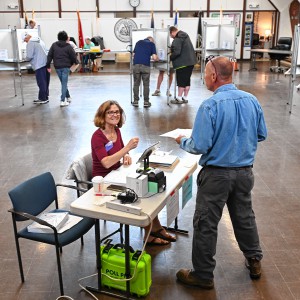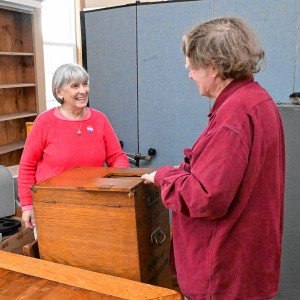Keeping ‘vulnerable road users’ safe: A year after passage of 4-foot law, MassBike advocating for other protective measures

Signs reminding drivers to provide space for bicyclists on Route 9 in Hadley just over the Coolidge Bridge. A year after MassBike played a key role in passage of a law aimed at making roads safer for “vulnerable users” — bicyclists, pedestrians and more — the coalition is again pushing for more law changes designed to add further protection for these users. STAFF PHOTO/CAROL LOLLIS
|
Published: 04-01-2024 10:38 AM
Modified: 04-01-2024 7:07 PM |
A year after its advocates played a key role in passage of a law aimed at making roads safer for “vulnerable users” — bicyclists, pedestrians and more — the Massachusetts Bicycle Coalition is again pushing for more changes designed to add further protection for these users.
MassBike in late January threw its support behind several new proposed bills that focus on automated enforcement, e-bikes, road safety and multi-use trails.
“These bills are important because we need to make sure everyone is safe on our roadways,” said Galen Mook, MassBike’s executive director of the statewide bicycle advocacy group.
To that end, about 40 members of the statewide group converged at the State House in late January to advocate for their legislative agenda, while others visited offices of politicians closer to home. Among those were Alexis Hosea-Abbott, a regional advocacy specialist for MassBike from Easthampton, who visited Rep. Dan Carey’s Easthampton office last month to discuss the proposed bills.
The legislative agenda comes on the heels of the bill An Act to Reduce Traffic Fatalities that went into effect on April 1, 2023. The law states that the operator of a motor vehicle must pass a vulnerable road user at a safe distance of not less than 4 feet and at a reasonable and proper speed. The state Department of Transportation has been installing signs along public ways in recent months to alert drivers to the law. Massachusetts was the 36th state in the country to enact such a law, which was first introduced in Oregon in 2007.
The law also provides legal explanations of vulnerable road users, which generally are defined as those who lack the safety features that come standard on cars, such as seatbelts or steel.
“At least at the current stage and the outcomes we received, the legislation is effective, but still requires further robust data analysis and education campaigns to enlarge the sphere of influence from the local level,” Mook said.
Hosea-Abbott said that although MassBike is dedicated to providing a definition of vulnerable road users in the state, it is always a general term requiring further measures to guarantee the safety of every cyclist.
Article continues after...
Yesterday's Most Read Articles
One such bill they back revolves around automated road safety camera enforcement, including the creation of a pilot program that would allow 10 cities and towns in Massachusetts to install cameras on school buses and roadsides.
The devices would produce digital photographs of a motor vehicle that commits a camera-enforceable violation — like running of a red light — at the location where the devices are installed.
Mook said the idea of the automated enforcement bill would cover the situation when some local police officers would issue citations when bicycles cross an intersection without dismounting.
“These accidents happen all the time,” Mook said.
In 2017, a police officer in Arlington detained a 59-year-old Belmont resident for riding her bike on the Minuteman Bikeway without halting at a stop sign, and for refusing to stop when an officer asked her to dismount her bike.
“This is not an effective use of enforcement, especially as safe yielding regulations are proving to create safer roadways in other states across the U.S.,” Mook said.
According to the National Highway Traffic Safety Administration’s summary of stop-as-yield laws last year, bicycle injuries in traffic accidents in Idaho dropped by 14.5% the year after that state enacted the bill. The Delaware State House supported a similar law in 2017, and the number of bicycle-related traffic accidents at stop sign intersections decreased by 23% in two and a half years after the law’s enactment.
MassBike is also backing legislation that would expand the definition of e-bikes to include Class 3 electric bicycles, which were not covered by the new legislation approved last year.
The definition states that Class 3 e-bikes are equipped with a motor that provides assistance only when the rider is pedaling, and that ceases to provide assistance when the bicycle reaches the speed of 28 mph — a number only an athletic or more experienced cyclist can achieve, according to Hosea-Abbott.
She said e-bikes are not directly linked to many high-profile deaths, but often cause bike fires.
Under the proposed changes, Class 3 e-bikes would be prohibited from being ridden on a bike path or shared-use path unless permitted by the municipality, local authority or state agency having jurisdiction over that path.
Additionally, the advocacy group supports a bill filed by state Rep. Natalie Blais, D-Deerfield, that would establish a grant program to fund e-bikes for municipalities, nonprofits and businesses.
The final bills on MassBike’s legislative agenda include two related to road safety and trail development.
One road safety bill redefines crosswalks as “marked crossings” and expands protections granted to vulnerable users, while a second would allow bicyclists to treat stop signs as yield.
The trail development legislation seeks to establish a municipal utility corridor public access program and allows municipalities to tax unused utility corridors to incentivize utilities to allow public access or to sell these corridors to the state or others to be turned into recreational trails.
Xinyi Yang writes for the Greenfield Recorder from the Boston University Statehouse Program.

 Political newcomer defeats Shores Ness for Deerfield Selectboard seat
Political newcomer defeats Shores Ness for Deerfield Selectboard seat New Salem election ushers in new Selectboard member
New Salem election ushers in new Selectboard member Bridge of Flowers in Shelburne Falls to open on plant sale day, May 11
Bridge of Flowers in Shelburne Falls to open on plant sale day, May 11 Community Legal Aid expands Disability Benefits Project to Franklin County
Community Legal Aid expands Disability Benefits Project to Franklin County
